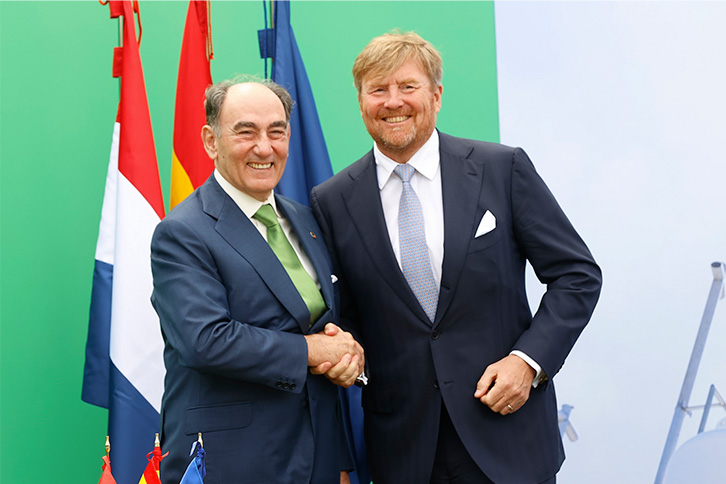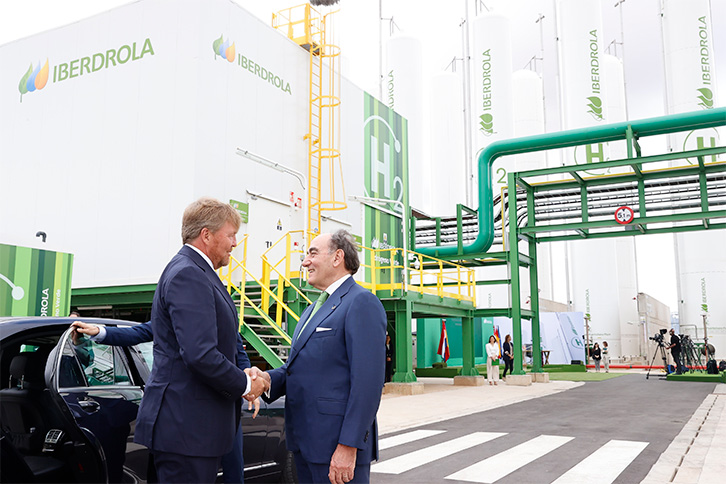News
Iberdrola, together with ACE Terminal and Hynetwork Services, will develop the green hydrogen maritime corridor between Spain and the Netherlands
The King of the Netherlands accompanied by Ignacio Galán visits the main green hydrogen production plant in Europe
- The Executive Chairman of Iberdrola received the King of the Netherlands at the Puertollano green hydrogen plant on the day two agreements were signed between the company, ACE Terminal and Hynetwork Services
- The agreements guarantee to enhance the logistics chain to decarbonize the industry of northern Europe
Iberdrola has taken a definitive step forward in the establishment of the green hydrogen maritime corridor between Spain and the Netherlands. The Executive Chairman of Iberdrola, Ignacio Galán, received His Majesty the King of the Netherlands today at the Puertollano plant on the day new agreements were signed between the company, ACE Terminal and Hynetwork Services.
Ignacio Galán, Executive Chairman of Iberdrola, said that "when we talk about green hydrogen, we are not talking about promises, we are talking about a reality and it demonstrates Iberdrola's commitment to new technologies and to our country, as we have been doing for many years. We remain firmly committed to the Single Energy Market as the best way to promote the huge investments needed if we want a secure, clean and competitive energy industry."
Mr Galán also added that "the current facilities in Puertollano are in a first phase and in the future we aim to multiply the capacity of the plant ten times. In addition, a few days ago, we also signed a contract to sell ammonia that we will produce in Huelva, more than 100,000 tons per year. We have planned investments in this sector of more than 3 billion euros, of which more than half will come to Spain"
Helmie Botter, Hydrogen Business Development Manager at Gasunie, said: "With this agreement we are strengthening the hydrogen corridor between Spain and the Netherlands. Through import logistics hubs, such as the Port of Rotterdam, and the national hydrogen network of Hynetwork Services, a subsidiary of Gasunie, to bring green hydrogen to European industrial users, the Netherlands is positioning itself to become the gateway for Northwest Europe with hydrogen."
The project partners, Walter Moone (President of New Energies & LNG Vopak); Cees van Gent (CEO of HES International) and Ulco Vermeulen (Executive Board of Gasunie) attended the signing of the agreement and expressed their satisfaction that Iberdrola has chosen its terminal to receive, store and distribute green ammonia and to transport green hydrogen. Together with Iberdrola, ACE Terminal takes a significant step in the establishment of the hydrogen value chain between Spain and the Netherlands.
Thanks to the agreements signed today, plans to develop a maritime corridor between Spain and the Netherlands are one step closer. Iberdrola aims to transport green ammonia to ACE Terminal's import facilities in the Port of Rotterdam, to handle and store, and convert ammonia into green hydrogen, for end use in industry, or for direct use in shipping and other industries in northwestern Europe.
Transport and distribution will be carried out through the Dutch national hydrogen network of Gasunie's subsidiary Hynetwork Services in the European market to customers in the chemical, steel, refining and fertilizer industries. These entities are established in clusters such as those in Rotterdam, Amsterdam, Zeeland and Chemelot in the Netherlands and in northwestern Europe.
With His Mastestad King Willem-Alexander as a distinguished witness, the alliances established mark an important step forward in the materialization of the agreement between Spain and the Netherlands. The objective is to establish the maritime corridor of green hydrogen between both countries as soon as possible that will help to decarbonize the industry of northern Europe. The maritime transport of competitive green hydrogen, which Iberdrola is already producing in Spain, is a key lever for this transformation to occur in the short term.
In addition to His Majesty the King of the Netherlands, the Minister of Climate and Energy Policy of the Netherlands, Robert Jetten; the Secretary of State for Energy, Sara Aagesen, Roel Nieuwenkamp, Ambassador of the Netherlands to Spain and Consuelo Fermenía Guardiola, Ambassador of Spain to the Netherlands, also attended.
The Puertollano plant has received more than 180 visits from governments, entrepreneurs and universities around the world. Among them, His Majesty the King of Spain during his inauguration, the Ministers of Energy of Australia, Chile and Slovenia, the Secretary of Environment of Brazil, the embassies of Turkey or Holland, or the Government delegations of Japan, Morocco, Colombia or Finland, as well as Chambers of Commerce from different countries.
Last December, Iberdrola reached an agreement with the Port of Rotterdam to export green hydrogen and its derivatives to the Netherlands. This new step represents a step forward in its commitment to promote the decarbonisation of industrial consumers in northern Europe.
Industrial Decarbonisation
The decarbonisation of industry in northern Europe is a challenge for the coming years in which Iberdrola wants to be central to, delivering real projects supplying green hydrogen to its customers. The company was the first to produce green hydrogen and will be the first to begin its export.
Spain has great renewables potential that will allow it to decarbonize its local industry. In addition, it has additional resources of competitive renewable energy to supply its European partners and contribute to building a greener and more connected Europe, guaranteeing its energy security and independence.
For this reason, Iberdrola, in its commitment to lead decarbonisation, is promoting, together with key players in the Dutch energy ecosystem, the joint development of the logistics chain necessary to make the green hydrogen corridor a reality.
Leader in renewable energy
The Iberdrola group has been investing significantly in renewable energy for more than two decades, as a core pillar to build its clean, reliable and smart business model. Thanks to this vision, the company is a world leader in renewable energy, with 40,344 MW of renewables capcity at the end of the first quarter of 2023.
Committed to the energy transition towards a low-emission economy, the company is now a leader in the green hydrogen revolution with three plants in operation by 2023. In total, there are 60 projects under development in eight countries to support decarbonisation in sectors such as heavy industry and transport.
Iberdrola's Puertollano plant, located in Ciudad Real, consists of a 100 MW photovoltaic solar plant. It has a lithium-ion battery system with a storage capacity of 20 MWh and the largest green hydrogen production system in Europe (20 MW). With an investment of 150 million euros, it will be able to produce up to 3,000 tons of green hydrogen per year, which would avoid the emission of 48,000 tons of CO2 per year.
About ACE Terminal
To facilitate the growing demand for hydrogen, three strategic partners: Gasunie, HES International and Vopak have joined forces and expertise to develop a hydrogen import terminal at the Port of Rotterdam. The "open access" terminal will enable the reception and storage of ammonia as a hydrogen carrier for customers in northwestern Europe. In addition, the terminal will provide the conversion of ammonia to hydrogen, the transhipment of ammonia and the subsequent transit of hydrogen and ammonia to end users.
The ACE Terminal will be built on the Maasvlakte in the Port of Rotterdam. The strategic location offers direct access from the North Sea and a connection to Rotterdam's industry and Gasunie's gas pipeline network to northwestern Europe. The terminal will utilize Gasunie's existing facilities, HES International's land and dock, and Vopak's ammonia storage know-how. The terminal is expected to be operational in 2026.
About Hynetwork Services
Hynetwork Services (a 100% subsidiary of N.V. Nederlandse Gasunie) is creating a national hydrogen network in the Netherlands that will link demand and supply ofCO2-free hydrogen. Five industrial groups will be connected to each other, to other countries and to hydrogen storage and import sites. This will be done mainly using existing infrastructure and partly using newly built infrastructure. Hydrogen Network Netherlands is being built in phases. The goal is to have the network completely completed by 2030.








